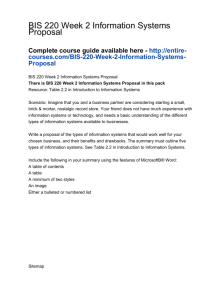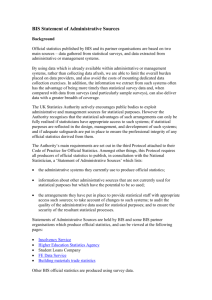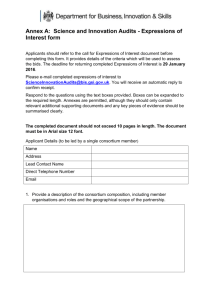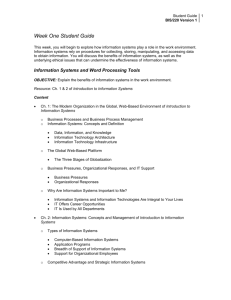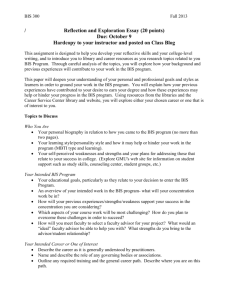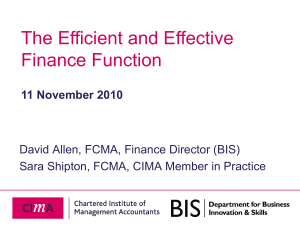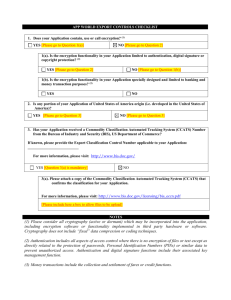Business Information Services (BIS) Report for FY14 With data contributions from Associate Professors Carissa Phillips and Yoo‐Seong Song Submitted by Associate Professor Becky Smith
advertisement
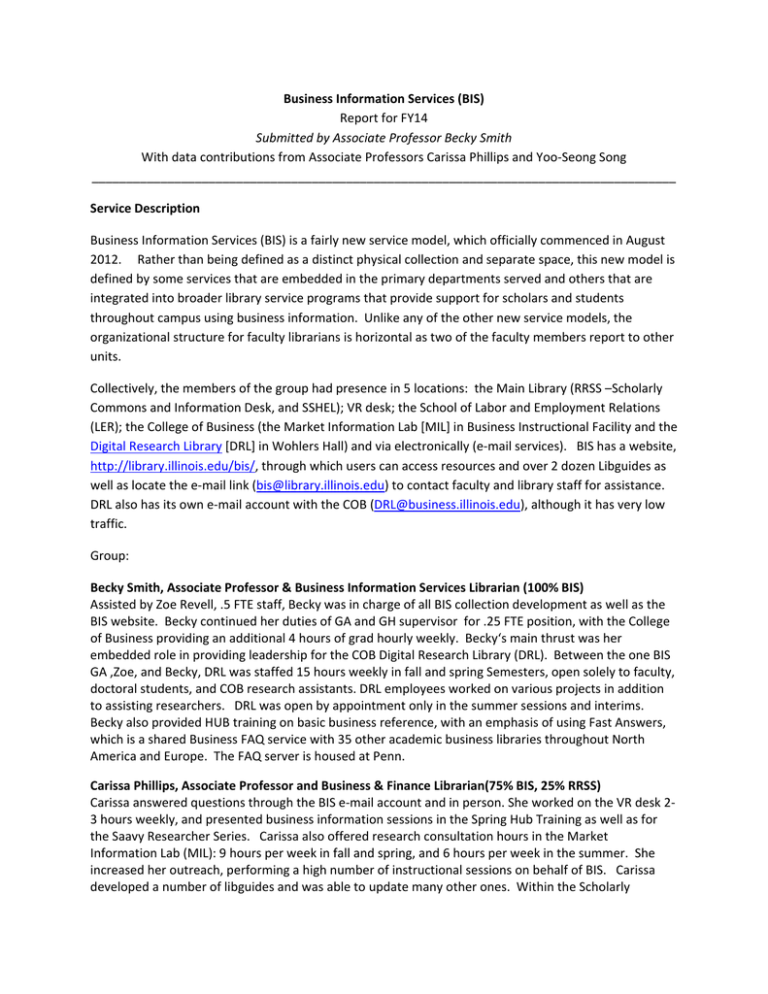
Business Information Services (BIS) Report for FY14 Submitted by Associate Professor Becky Smith With data contributions from Associate Professors Carissa Phillips and Yoo‐Seong Song _____________________________________________________________________________________ Service Description Business Information Services (BIS) is a fairly new service model, which officially commenced in August 2012. Rather than being defined as a distinct physical collection and separate space, this new model is defined by some services that are embedded in the primary departments served and others that are integrated into broader library service programs that provide support for scholars and students throughout campus using business information. Unlike any of the other new service models, the organizational structure for faculty librarians is horizontal as two of the faculty members report to other units. Collectively, the members of the group had presence in 5 locations: the Main Library (RRSS –Scholarly Commons and Information Desk, and SSHEL); VR desk; the School of Labor and Employment Relations (LER); the College of Business (the Market Information Lab [MIL] in Business Instructional Facility and the Digital Research Library [DRL] in Wohlers Hall) and via electronically (e‐mail services). BIS has a website, http://library.illinois.edu/bis/, through which users can access resources and over 2 dozen Libguides as well as locate the e‐mail link (bis@library.illinois.edu) to contact faculty and library staff for assistance. DRL also has its own e‐mail account with the COB (DRL@business.illinois.edu), although it has very low traffic. Group: Becky Smith, Associate Professor & Business Information Services Librarian (100% BIS) Assisted by Zoe Revell, .5 FTE staff, Becky was in charge of all BIS collection development as well as the BIS website. Becky continued her duties of GA and GH supervisor for .25 FTE position, with the College of Business providing an additional 4 hours of grad hourly weekly. Becky‘s main thrust was her embedded role in providing leadership for the COB Digital Research Library (DRL). Between the one BIS GA ,Zoe, and Becky, DRL was staffed 15 hours weekly in fall and spring Semesters, open solely to faculty, doctoral students, and COB research assistants. DRL employees worked on various projects in addition to assisting researchers. DRL was open by appointment only in the summer sessions and interims. Becky also provided HUB training on basic business reference, with an emphasis of using Fast Answers, which is a shared Business FAQ service with 35 other academic business libraries throughout North America and Europe. The FAQ server is housed at Penn. Carissa Phillips, Associate Professor and Business & Finance Librarian(75% BIS, 25% RRSS) Carissa answered questions through the BIS e‐mail account and in person. She worked on the VR desk 2‐ 3 hours weekly, and presented business information sessions in the Spring Hub Training as well as for the Saavy Researcher Series. Carissa also offered research consultation hours in the Market Information Lab (MIL): 9 hours per week in fall and spring, and 6 hours per week in the summer. She increased her outreach, performing a high number of instructional sessions on behalf of BIS. Carissa developed a number of libguides and was able to update many other ones. Within the Scholarly Commons, she continued development on expertise on software tools such as ABYY Fine Reader, SAS, and R. Yoo‐Seong Song, Associate Professor and Labor/Economics Librarian, (65% SSHEL, 25% IAS, 10% BIS— estimate) Yoo‐Seong’ s area of expertise is career information searching, thus he continued to give presentations on career searching. He also performed instructional sessions on marketing research, LER, and international business. Yoo‐Seong maintained the Career Corner libguide, as well as international business and marketing research libguides, and the LER Virtual Library website. Yoo‐Seong also answered e‐mail reference questions and worked the VR desk 2 hours weekly. Zoe Revell, LOA, 50% BIS, 50% Staff Development & Training (Office of Services) Zoe worked with Technical Services on other serials issues. Zoe also helped supervise the BIS GA and she worked at the InfoDesk on behalf of BIS. She also created Google calendars for DRL scheduling. Graduate Assistants (all on State Funds): Steven Sprieser, .25FTE, BIS, with 4 hours weekly of graduate hourly wages provided by the COB Office of Research. Projects included video shorts on searching for company and industry information—a 8 part series (using Camtasia and Audacity), updating Fast Answers (a shared business FAQ database created by Penn’s Lippincott Library in collaboration of 32 other major academic business libraries in North America & Europe), assisted on the DRL Dispatch newsletter to the COB and collaborated with Becky and Zoe in answering BIS e‐mail inquiries. Steve also did screen shots and forwarded them to BIS colleagues on new databases for answering reference questions. Accomplishments for the BIS: An increase in attendees for instructional sessions, although the number of sessions decreased. Yoo‐Seong reports that career sessions are now mandatory, which may explain the increase of attendees. An increase of outreach/embedded/consultation hours for BIS librarians, staff, and GA’s More opportunities for advanced reference and project work, such as video clips on company and industry information (8 part series), one‐on‐one time for dataset creation and manipulation, and citation counts for the College of Business P & T candidates (as requested) Increased number of individual and tailored libguides Continuation of the e‐mail newsletter, DRL Dispatch, which promotes DRL’s services, new databases and showcases other relevant digital collections of BIS and the University Library via thematic months to faculty and doctoral students BIS members authored 2 of the top 10 most popular libguides Becky had an opportunity to collaborate with the BioSciences Librarian on instruction & reference assistance to a Professional Master’s in Science group performing experiential work. FY14 Challenges for BIS: There were 6000 monographic location title changes needed, thus students continued to look for BEL as a location. CAM started work on suppressing BEL, Commerce, and LER Location records this summer, but we aren’t certain how much was accomplished. Meeting as a group, due to staggered embedded hours and duties in new units, instructional demands, and committee meetings. The group only met three times in person. When staffing DRL, the GA and Zoe possessed limited knowledge in how to help the doctoral students in using SDC (or other sophisticated databases) for identifying appropriate fields (aka variables) in financial or merger/acquisition databases (often READ 4‐5 scale, with an occasional 6) when Becky was not scheduled to work with them. Having to use over 95% of the CRC0 fund to pay for serials inflation and any new databases. BIS’s partners on some databases no longer had any funds to contribute. Roles and responsibilities were still vague for some of the group members, although Becky’s job description was redone and approved last fall. Occasionally, undergraduate students were sent to DRL for class assignment assistance. Whether or not to promote BIS as a brand. UGL offered to pass out any BIS flyers at Quad Day in August 2014, but as the group seldom met, this issue was not addressed, thus no flyers or PR materials were created. BIS Plans for 2015 Next year’s top goal of the group is to commence full assessment activities in September 2014, led by the AUL for User Services and the Coordinator of Library Assessment. Otherwise, BIS members’ plans include the following: Carissa will be on sabbatical for most of the year. When requested by faculty, staff or BIS e‐ mail, Becky and Yoo‐Seong, as well as the MIL (for Bloomberg) will be picking up more of Carissa’s questions. The BIS half‐ time staff person, Zoe, will continue to check with CAM on serials records processing and ensuring the resources are discoverable via the online catalog. Additionally, she will continue to work 2.5 hours weekly at the Info Desk on behalf of BIS and provide training as needed for the new GA. Upcoming/Ongoing Challenges: The GA allocations have been increased to 35% for FY15, thus project work for more robust virtual services will continue to be balanced with reference services. Virtual services do require different skills and expertise that are different in keeping the website up to date and with changes in b‐school curriculum that is incorporating more flip courses. DRL will be taking on more advising for COB purchases of business databases BIS cannot afford (or cannot do due to issues related to procurement regulations). This year, BIS will have no monographic monies to cover 20% of the serials inflation, thus some cancellations will have to be made to lesser used databases and journals. We were able only to purchase one new e‐ resource last year as the appetite for market research (undergrads and grad students) and financial services datasets (faculty & doctoral students) far exceed what our budget allows. Illinois is in the bottom tier of its peers in the Academic Business Library Directors (ABLD) group (the top 50 academic business libraries in North America) in terms of collection budgets for BIS, thus we will continue to lag behind peer and aspirant b‐school collections. Communication between members of the group, as we are scattered in 5 places. Sometimes we could not tell if someone had answered the e‐mail question (or not) via the BIS e‐mail account. What counts as a BIS question if one works in other units Reference Statistics BIS members (including staff and GA) answered 661 questions via in‐person, e‐mail, phone and chat. This is an increase from last year (5%). This number excludes statistics from LER as LER keeps its own statistics. The top 10 categories for types of questions were these, according to Desktracker: BEL‐This Question is About: 1 = 25% Finance 2 = 17% Other 3 = 10% Company Information 4 = 8% Database Access 5 = 7% Mergers & Acquisitions 6 = 5% Accounting 7 = 4% Management 8 = 4% Marketing 9 = 4% International Business 10 = 3% Industry Information The rest were splintered amongst other sub‐categories of accounting, finance, and management. This is a slight change from last year, whereby “Other” (depicting directional or hours) was at the top of the list. DRL backtracked Desktracker questions that were deemed “Data Assistance” category (a new category), and roughly one third were for data assistance, mainly in the subject area of finance. Note: All BIS members agreed that going forward into FY15, they would check off whether or not the reference requests were in the “Data Assistance” category. Within the total number of reference questions, the following rankings reflect the different channels, patron types and levels of effort for assistance. For In‐Person: 1 = 2 = 3 = 4 = 5 = 34% In Person <5 Minutes 31% In Person Consultation >30 minutes 18% In Person 5‐15 Minutes 15% In Person 15‐30 minutes 1% In Person 30 Minutes ‐ 1 Hour 66% was 5 minutes or more, an increase of 8% from last year. For E‐mail: 1 = 32% Email 5‐15 minutes 2 = 27% Email Consultation >30 minutes 3 = 22% Email 15‐30 minutes 4 = 17% Email < 5 minutes 5 = 2% Email 1 ‐ 3 Hours 85% of answering queries were 5 minutes or more, slight increase of 2% compared to FY13. E‐mail consultations lasting more than 30 minutes was up 13%. The Chat and Phone percentages are omitted as those channels of transactions are significantly lower. For Patron Type: 1 = 212 (36%) Graduate Student 2 = 128 (22%) Undergraduate Student 3 = 122 (21%) Faculty/Staff 4 = 70 (12%) Other UIUC Desktracker previously had a PhD category patron type, but that was eliminated in August 2012 in order to make Desktracker categories more uniform across the Libraries. The current data reflects 9% less research assistance to graduate students (FY13, it was 45%), but an uptick of 3% to faculty/staff and a new identifiable category, alumni. 5 = 26 (4%) Unknown 6 = 13 (2%) Outside UIUC/Non‐Affiliate 7 = 13 (2%) Alumni For READ Scale: 1 = 42% 4 2 = 30% 3 3 = 11% 1 4 = 10% 2 5 = 6% 5 6 = 1% 6 READ Scale of 3‐4 is fairly usual for BIS subject expertise, but also illustrates experience levels of the group members. Last year, more questions were in the Read Scale 3 range. This year, a significant number were in the Read Scale 4 range. 79% of the questions were in upper scale range, compared to 6% in FY13. All group members reported that consultations appeared to be taking longer. Instructional Statistics Overall, BIS members performed 33 instructional sessions, down over 50%, but the number of attendees seems to have increased. Each BIS faculty member has her/his way of classifying/identifying instructional activities and agrees that variances are all right. Faculty report individual statistics in their personal annual reports. Other –Technical Services Statistics N/A as CAM took over this responsibility and no data were reported as of 8/29/2014
